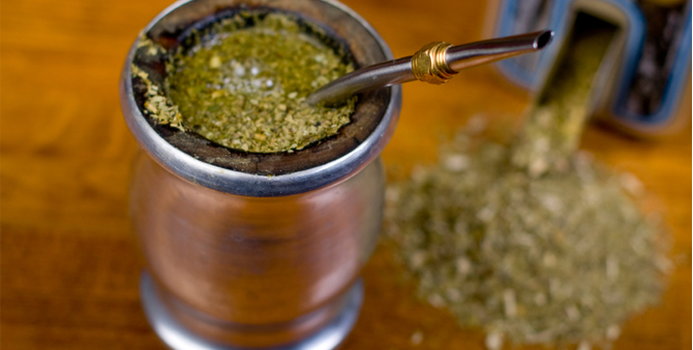Commonly consumed in herbal teas or as dietary supplements such as energy drinks, caffeinated Yerba mate is an herb made from holly plants grown in South America. This herb may provide you with several health benefits and help boost your energy. Yerba mate products are generally low in calories, especially Yerba mate herbal teas. However, use caution when drinking Yerba mate energy shots or drinks because they are often marketed as dietary supplements -- which are not strictly regulated by the U.S. Food and Drug Administration -- and often contain added sugar.
Disease-Reducing Phytochemicals
Yerba mate is an excellent source of phytochemicals, such as polyphenols and flavonoids, according to a review published in 2012 in Animal Laboratory Research. Polyphenols may have antioxidant properties and play a role in maximizing your health, while reducing chronic disease risks. Polyphenols present in Yerba mate help lower low-density lipoprotein, or LDL, blood cholesterol, according to a study published in 2009 in the Journal of Agriculture and Food Chemistry, which helps reduce your risk for heart disease. The 2012 review in Animal Laboratory Research reports that Yerba mate may help reduce body fat accumulation, increase energy expenditure by boosting metabolism, reduce weight gain, lower blood cholesterol, reduce triglycerides, decrease glucose concentration and could lower your risk for developing obesity and diabetes.
Caffeine Content
Caffeine is naturally present in Yerba mate, which is one reason it works well as an ingredient in energy drinks. While the caffeine content of Yerba mate may vary, Guayaki Yerba mate contains 40 milligrams of caffeine in each 1.5-teaspoon portion of leaves and stems, which is about the same amount as one Yerba mate tea bag. In comparison, an 8-ounce cup of brewed coffee provides 80 to 135 milligrams of caffeine and brewed tea contains 40 to 60 milligrams in each 8-ounce serving, according to the University of Utah. A review published in 2010 in Nutrition reports that ingesting moderate amounts of caffeine boosts energy, increases daily energy expenditure, decreases motor and mental fatigue, enhances physical and cognitive performance, and decreases effort associated with exercise. However, consuming caffeine late in the day can make getting to sleep at night difficult.
Calorie Count
The number of calories present in Yerba mate varies, depending on the type of product you choose. Guayaki Yerba mate leaves plus stems provide just 5 calories in each 1.5 teaspoon portion, which equals one Yerba mate tea bag. A 2-ounce portion, equivalent to 1/4 cup, of a lemon-flavored Guayaki Yerba mate energy shot provides 35 calories and contains additional herbs, added sugar and vitamins in addition to Yerba mate.
Carbohydrates, Vitamins and Minerals
Yerba mate often provides vitamins, minerals and carbohydrates, but little or no protein and fat. Yerba mate contains phosphorous, iron, calcium, and vitamins B1, B2 and C, according to the 2012 review published in Animal Laboratory Research. A 1.5-teaspoon portion of Guayaki Yerba mate leaves contains just 1 gram of carbohydrates. Yerba mate lemon-flavored energy shots are fortified with vitamins B-12 and C, contain lemon flavor and have 8 grams of carbohydrates, which are mainly sugar from evaporated cane juice, in them. Some products, like energy bars that contain Yerba mate as an ingredient, often provide some protein and fat.

An experienced health, nutrition and fitness writer, Erin Coleman is a registered and licensed dietitian and holds a dietetics degree from the University of Wisconsin-Madison. She also has worked as a clinical dietitian and health educator in outpatient settings. Erin's work is published on popular health websites, such as TheNest.com and JillianMichaels.com



